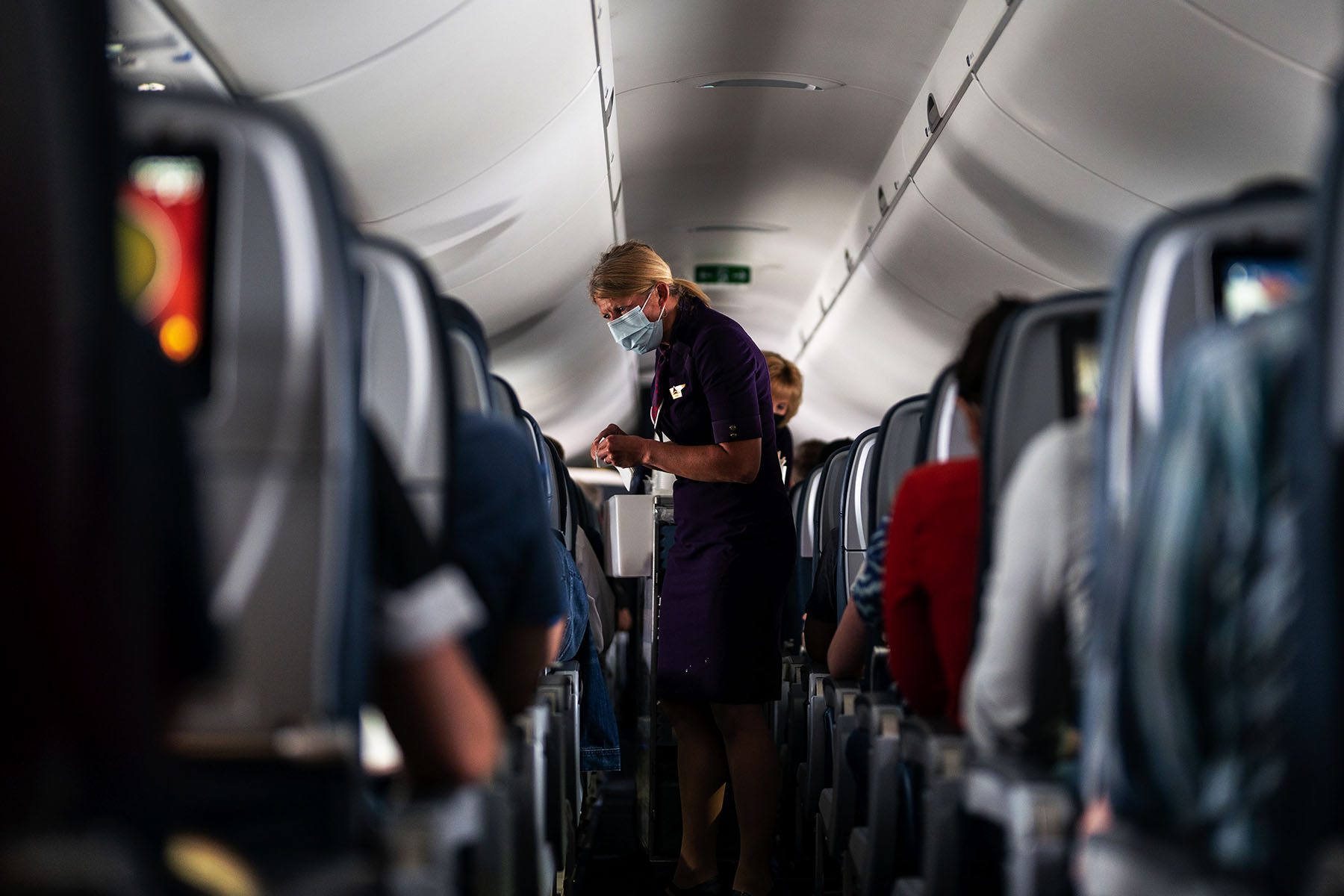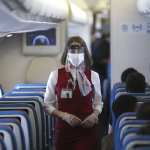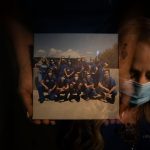The fight broke out over bags. After the plane touched down in Miami, one passenger was not getting his luggage down from the overhead bin fast enough, at least not in the eyes of the man behind him. That man, who is White, started shouting racial slurs at the other passenger, a Black man.
In the front of the plane, flight attendant Cher Taylor heard the commotion just before the angry man punched the one pulling down his bags until he fell on his back into a row of seats. Taylor started running.
“I’ll beat you good, I’ll kill you,” the man was shouting, punctuating the end of each sentence with a racial slur.
Taylor, a Black woman, tried to step between them, unsure of how to intervene. When the White man finally stepped back, leaving the other man on the ground, he and his family walked off the plane. The gate agents couldn’t hold them, and the police did not arrive in time. The Black man and his family stayed behind for the police report. To Taylor, the optics were clear: One man got to walk away.
When she got to the hotel later that day, all Taylor could think about was the word — the slur.
“It triggered something in my soul that will never, ever leave,” she said. She dreamt of the fight that night, but this time she was being forced to watch. She called her therapist. When she got home, she didn’t go outside for five days.
Being a flight attendant was supposed to be her “fun” job, the job she took after a 22-year career in banking that afforded her the opportunity to continue working with customers, but also travel.
In the past year and a half, that job has morphed. When the pandemic began, Taylor took leave from work. By the time she returned in July 2021 after a surgery, she knew she was doing so in a landscape that was alien to her.
This year, there has been a more than five-fold increase in the number of violent incidents on planes. The Federal Aviation Administration, which is chiefly responsible for investigating incidents of unruly passenger behavior, initiated 183 investigations in 2020 — about average, though likely high for a year when travel was significantly interrupted.
As of mid-November 2021, the FAA has initiated 990 investigations.
In all, there have been reports of 5,240 unruly incidents, 72 percent of them related to mask mandates. The FAA has opened 245 enforcement cases among those, and 37 of the most violent events are being investigated by the FBI. Fines have also gone up to as much as $37,000 per incident, while the FAA is also trying to crack down on to-go alcohol sales to help reduce the number of incidents involving inebriated passengers. Several major airlines, including American and Southwest, have suspended in-flight alcohol sales.
But the new enforcement policies are just that — new. And the busy holiday travel season is about to begin, at a time when airlines have been struggling to manage the surge in demand for flights with labor force shortages and fewer flight attendants choosing to take on overtime hours. In October, that kind of breakdown led to about 2,000 flight cancellations at Southwest Airlines, for example.
All of those factors, plus the ongoing, compounding stressors brought on by the pandemic, could lead to additional turbulence among passengers and staff in the skies.
Flight attendants, a workforce that is 80 percent women, are often the last line of defense in many of these incidents. Some of the unruly or violent behavior is directed at them, specifically, and flight attendants have been heavily beaten and even hospitalized this year.
“It’s redefining the environment that we work in and what we are doing every single day. It’s exhausting, it’s taxing and it’s also disorienting about who we are and what we are there to do,” said Sara Nelson, the president of the Association of Flight Attendants-CWA, a union that represents about 50,000 flight attendants. Bad days and incidents happened pre-pandemic, “but it was a one-off, not something that was a regular occurrence and not something that was heavy on your mind and heavy on your family's mind when you're putting on your uniform.”
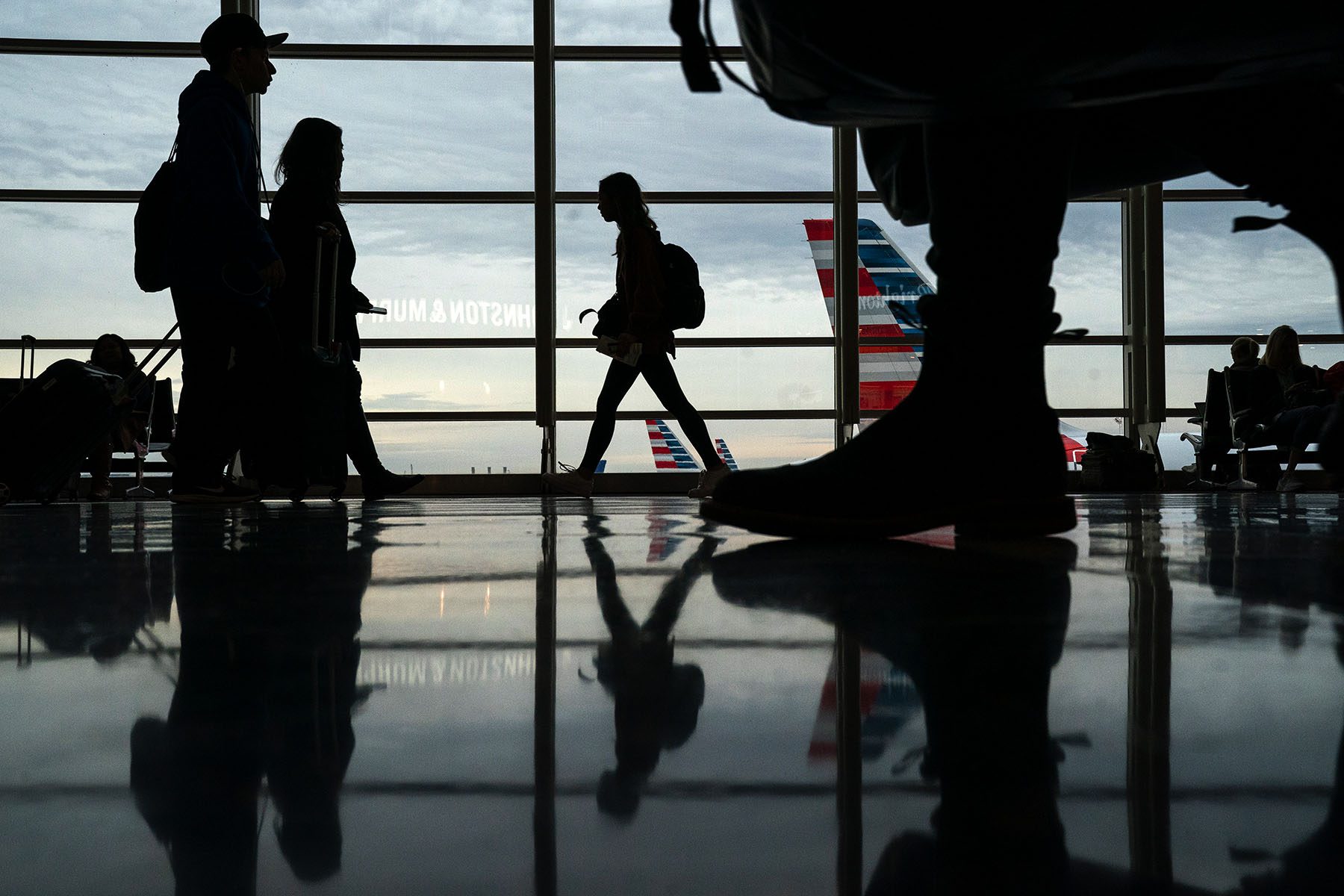
Last year around this time, the chief concern among flight attendants was getting sick in the sky, or whether they could keep their job after mass furloughs that began last fall. Those fears haven’t gone away — more than 3,500 have contracted the virus and more than 20 have died — but now they are joined by the anxiety of not knowing what kind of passengers they’ll encounter at work.
Brett Snyder, founder of the airline analysis site CrankyFlier.com, said a couple factors may be converging: the psychological impact of the pandemic and how it’s changed the way people behave in group settings; the political polarization around mask policies; and the rise of racially charged incidents, particularly against Black people and Asian Americans and Pacific Islanders.
In a recent survey by the flight attendants union of 5,000 attendants, 61 percent said disruptive passengers used racist, sexist or homophobic slurs during incidents of violence. The majority of flight attendants — more than 85 percent — had dealt with unruly passengers in the first half of 2021, and nearly 60 percent had experienced at least five incidents this year. One in six flight attendants had been part of a physical attack.
The federal mask mandate is undoubtedly playing a role. Earlier in the pandemic, airlines had individual policies on masking, which created some confusion around passenger expectations. It wasn’t until February that a federal mandate was put in place — for now, it will continue until January 18, 2022 — and the issue has only become more divisive.
“Flight attendants are not supposed to be police,” Snyder said. “But with the mask mandate, they're forced to be police, so it forces confrontation.”
But the masks are only one part of the problem, Nelson cautioned. Part of the reason there is such a focus on masks is because those incidents are also being so closely tracked as a result of the federal mandate. The rest of the unruly passenger incidents are not broken down by type — whether they are racially motivated, or involve sexual harassment or physical violence.
An increase in to-go alcohol sales during the pandemic is also playing a role, she said. Signs posted in airports promoting “destination happy hour” and drinks to-go have led to a rise in inebriated passengers, according to the union’s analysis. Alcohol played a role in about 58 percent of the cases of violence flight attendants responded to.
FAA Administrator Steve Dickson sent a letter to airports in August asking them to work with concessionaires to educate passengers that they can’t board a flight while intoxicated, nor can they carry open alcohol containers with them onto planes.
Critics say the FAA is still not doing enough, pursuing only a small portion of the cases that arise. But the situation is challenging, Nelson said, complicated by the fact that the FAA doesn’t have jurisdiction to criminally prosecute the cases, and it already suffers from lack of funding and small staffing. All of that is compounded by unclear regulations about how cases should be handled — and by whom — when they take place mid-flight.
“The 37 reports that [the FAA] referred to [the Department of Justice] were about prioritizing. They could do a data dump on DOJ and then it would actually take longer to get results,” Nelson said. “We need public criminal prosecution and consequences levied ASAP.”
At a hearing before the House’s Homeland Security Subcommittee on Transportation and Maritime Security this week, some potential solutions emerged.
John Casaretti, the president of Air Marshal Association, suggested that what was needed was an investigative body that can serve as an intermediary between local police and federal investigators.
“I submit that air marshals could actually do this and could be liaison with the airlines and anybody who was assaulted,” Casaretti said. “That would take a lot of the burden off existing investigators or agencies that quite honestly may not respond to checkpoints for these types of low-level incidents or to the gate agents. I can't imagine that an FBI agent would be taking time out to come to an airport just to question an individual. I have not seen it happen unless it's a high-profile thing.”
There have also been more calls for a sort of no-fly list that could be shared among airlines, like the lists airlines already keep about unruly passengers, but different from the one the FBI keeps regarding suspected terrorists. Transportation Secretary Pete Buttigieg has argued that a federal list should be considered for violent passengers.
But that would require better enforcement policies, such as more sufficient police resources to get more accurate accounts of incidents, Snyder said.
“It's the accuracy of the whole thing. When you ban someone from flying on any airline, that is a severe penalty that could ruin family relationships, you can't see people, that’s a big deal. So if you're going to do that, you need to make sure that there's a better system for ensuring that this is actually warranted,” he said.
At the congressional hearing, Nelson; Everett Kelley, the national president of the American Federation of Government Employees; and John Samuelsen, the international president of the Transport Workers Union of America, argued that a list could include only people who have gone through a due process case with the FBI and been convicted. At least, Nelson said, airlines should be able to share information about passengers who they have individually investigated and banned.
“If there's not a no-fly list, people are going to continue to get on the planes and are going to continue to assault plane crews and gate agents,” Samuelsen said. “It's an absolute must that this list be established and it be done in a fair way where due process is protected.”
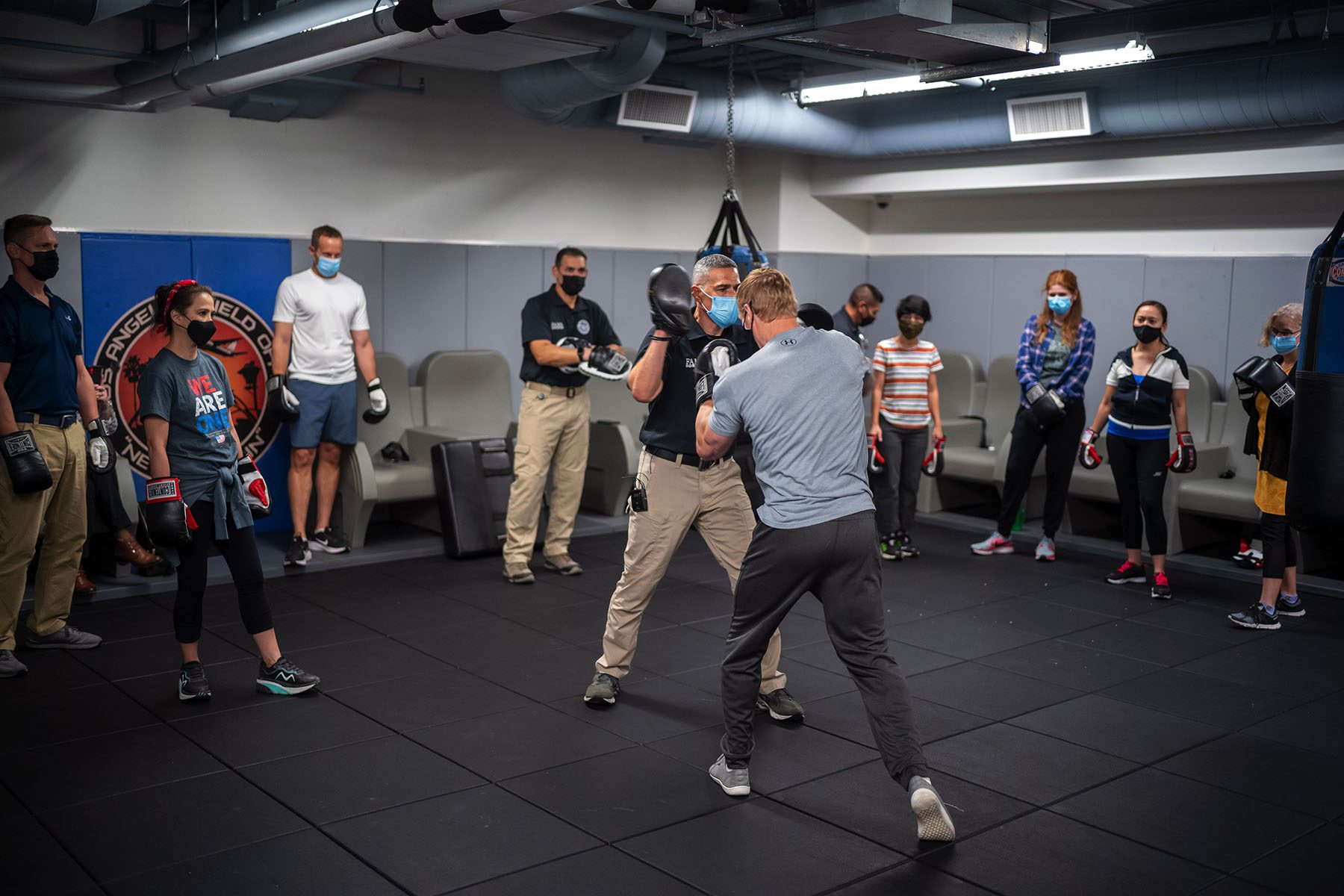
For flight attendants, who have faced violence and, especially, sexual harassment for years, the events of this year could be an opportunity to make self-defense training mandatory — an effort that has been ongoing since the 9/11 terrorist attacks. At the time, training was put in place for flight attendants, but it has become voluntary.
“They don't have the repetitive training that's necessary in order to be able to respond on board when an attack is imminent. We don't usually have warning for [these incidents] — this has to be an immediate reaction and that only comes with repetitive training,” Nelson said during the congressional hearing. “So this must be mandatory, must be in our initial training and in our recurrent training each year.”
And sexual harassment continues to be a major issue for flight attendants, as well. The industry has its roots in a history of misogynistic marketing and advertising that tried to lure men to flights by promising young, attractive women attendants. That legacy has been hard to shake, with passengers still harassing attendants regularly.
Then-President Donald Trump’s administration set up a task force to develop recommendations on how to reduce incidents of in-flight sexual misconduct, but the task force’s recommendations were not released until last year, and so far, no action has been taken on them.
Meanwhile, sexual harassment and sexual assault are still not tracked by the FAA as unique incidents on planes, so it’s difficult to capture the frequency of these events even though flight attendant surveys suggest they are still prevalent.
“When you are not tracking those things, you are sending the message that it’s not important,” Nelson said.
For the profession overall, nearly two years of intense added stress, violence and loss are leading more attendants to reduce their hours. They’re taking on less overtime, Nelson said, something that could affect airline schedules because airlines work under the assumption that flight attendants will pick up additional work.
Taylor, the flight attendant who witnessed the violent racial attack, has already reduced her hours from about 114 to 120 a month to around 80 to 99.
The incidents haven’t stopped, she said — people turning on her if there is a delay in deplaning or if she tells them their bags have to fit under the seat in front of them. She’s on edge every day she gets on a plane. And is worried about it even more as the holidays approach.
“As women in general, we suppress so much,” Taylor said. “I’m so afraid I’m going to explode just from holding everything inside.”
